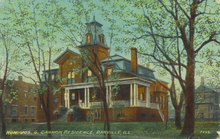Joseph Gurney Cannon
Joseph Gurney Cannon (* 7. May 1836 in Guilford , Guilford County , North Carolina ; † 12. November 1926 in Danville , Illinois ) was an American lawyer and politician ( Republican Party ), the 1903-1911 Speaker of the House was . He was the first Congressman to serve over 40 years.
Early years
Joseph Gurney Cannon was born as one of two sons Horace and Gulielma Hollingsworth Cannon. At the age of four, he moved to Bloomingdale , Indiana with his parents . After school, Cannon studied law under the later US Secretary of the Interior John Palmer Usher in Terre Haute and attended the law faculty of the University of Cincinnati in Ohio for a semester . He was admitted to the bar in 1858 and began working in Terre Haute.
Disappointed that Usher didn't offer him a place in his office, Cannon drove to Chicago in 1859 . Since he had not bought a train ticket, he was expelled from the train in Tuscola , Illinois, where he stayed and was State Attorney from 1861 to 1868 . Here he married his wife Mary P. Reed in 1862, who gave birth to two daughters. In 1876 he moved to Danville, which was his hometown for the rest of his life.
Political rise
As a Republican, Cannon was elected to the US House of Representatives, where he initially held nine legislative terms (March 4, 1873 to March 3, 1891). He did not get to the 52nd Congress, but in the 53rd and the nine following (March 4, 1893 to March 3, 1913) he was able to represent Illinois again. His last consecutive term of office ranged from March 4, 1915 to March 3, 1923.
During his tenure, he was Chairman of the Committee on Appropriations and the Committee on Expenditures in the Post Office Department and the Committee on Rules . It took him five attempts before he succeeded in taking over the office of Speaker of the House of Representatives in 1903. To this day, he is considered one of the most authoritarian and controversial speakers who liked to go it alone and tried to concentrate power within himself. It was not until 1910 that his political power was restricted by the fact that Democrats and dissatisfied Republicans jointly ensured, under the leadership of George W. Norris , that Cannon no longer chaired the Committee on Rules and thus could not fill the other committees with members of his choice. He remained in office as spokesman until 1911. The conservative and reactionary Cannon could do little with Theodore Roosevelt's increasingly progressive policies . In 1912 he was one of four Republicans who opposed Roosevelt's return to the presidency.
There were also points of conflict with Woodrow Wilson . Cannon was reluctant to join the First World War and criticized the League of Nations . Despite his authoritarian nature, Cannon was popular and was often referred to as "Uncle Joe" in the newspapers. But his ultra-conservative way of concentrating power also coined the term cannonism in the USA .
Death and legacy
Cannon remained in office until March 3, 1923, when he did not stand for re-election. On his last day in office, he was on the cover of the first Time Magazine .
Joseph Gurney Cannon died on November 12, 1926 at his Danville estate. The Cannon House Office Building was named in his honor in 1962.
Individual evidence
Web links
- Joseph Gurney Cannon in the Biographical Directory of the United States Congress (English)
- Joseph Gurney Cannon in the database of Find a Grave (English)
- Joseph Gurney Cannon in the nndb (English)
- Article on Joseph G. Cannon in the New York Times
| personal data | |
|---|---|
| SURNAME | Cannon, Joseph Gurney |
| BRIEF DESCRIPTION | American politician |
| DATE OF BIRTH | May 7, 1836 |
| PLACE OF BIRTH | Guilford , North Carolina |
| DATE OF DEATH | November 12, 1926 |
| Place of death | Danville , Illinois |



